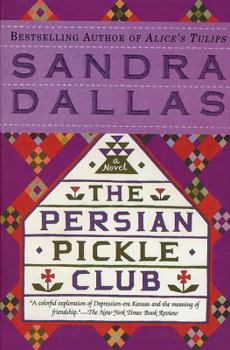The Persian Pickle Club
Select Format
Select Condition 
Book Overview
It is the 1930s, and hard times have hit Harveyville, Kansas, where the crops are burning up, and there's not a job to be found. For Queenie Bean, a young farm wife, a highlight of each week is the gathering of the Persian Pickle Club, a group of local ladies dedicated to improving their minds, exchanging gossip, and putting their quilting skills to good use. When a new member of the club stirs up a dark secret, the women must band together to support and protect one another. In her magical, memorable novel, Sandra Dallas explores the ties that unite women through good times and bad. This description may be from another edition of this product.
Format:Paperback
Language:English
ISBN:0312147015
ISBN13:9780312147013
Release Date:September 1996
Publisher:St. Martin's Press
Length:196 Pages
Weight:0.51 lbs.
Dimensions:0.6" x 5.5" x 8.5"














